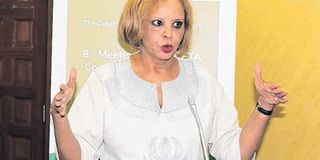TZ urged to ratify trade pact

A senior trade expert with the AU Commission, Dr Halima Noor-Abdi, speaks during a past event. photo | file
What you need to know:
- The AfCFTA may come into force in July after two countries hand in instruments of ratification
Arusha. The African Union is reaching out to Tanzania over the African Continental Free Trade Area (AfCFTA) pact, which may come into force this year.
“We have been engaging Tanzania and will continue to engage on how it will benefit by ratifying the agreement,” said Dr Halima Noor-Abdi, a senior trade expert with the AU Commission.
She told reporters that the pact would come into force in July this year, efforts were underway to persuade more countries to ratify the agreement.
The pact will come into force from July should two of the 22 countries, which have ratified it, hand in the instruments of ratification to the AU Commission.
Tanzania is among more than 30 African countries that are yet to ratify the agreement alongside Burundi and South Sudan in the East African Community (EAC) bloc.
Efforts to get a government response as to when Tanzania would append its another signature on the continental trade agreement proved futile yesterday.
The minister for Industry and Trade Joseph Kakunda could not be reached for a clarification as are key stakeholders in the trade sector. However, a senior trade official in the ministry, Ombeni Mwanga, admitted in Arusha yesterday that governments were aware of “the unfinished work’.
He made the remarks when he opened one of a series of workshops organised by the AU Commission to lay ground for the free trade agreement in the continent.
Without commenting on the country’s foot dragging on the pact, the official stated: ”We are all aware of the outstanding work for full implementation of the AfCFTA”.
He added: “The timely completion of the unfinished work will allow smooth flow of goods and services across the continent as soon as possible”.
Nevertheless, Mr Mwanga observed that one of the contentious issues for the proposed trade pact in the African continent was tariff liberalisation.
“Tariff liberalisation is not an easy task at all. Negotiations on market access are very complex,” he pointed out during the workshop at Mt Meru Hotel.
According to Mr Alexander Rubanga, who is the chairman of the negotiating forum for AfCFTA, Zimbabwe and Sierra Leone have ratified the pact, but were yet to hand in the instruments of ratification.
“Once they hand in the instrument of ratification, AfCFTA will come into force,” he told reporters on the sidelines of the workshop attended by trade experts from EAC and three other trade blocs.
AfCFTA was unveiled by the AU in Kigali, Rwanda, last year.
It is aimed at becoming the world’s largest single market with a cumulative Gross Domestic Product of $3.4 trillion.


